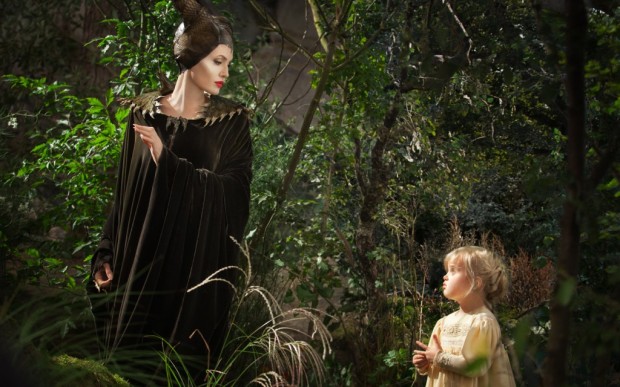 Directed by Robert Stromberg
Directed by Robert Stromberg
Starring Angelina Jolie, Sam Riley, Elle Fanning, Sharlto Copley, Imelda Staunton
This current trend of fairy tale reworkings isn’t going away any time soon. We’ve had Red Riding Hood, Alice In Wonderland, Oz The Great And Powerful, Snow White And The Huntsman, Mirror, Mirror, etcetera and ad infinitum. Kenneth Branagh, of all people, is currently beavering away on a new version of Cinderella. Into this crowded field comes Maleficent, a film that embodies both the best and worst elements of this freshly-emerged subgenre.
So, the good: it’s a Disney production, which guarantees a certain amount of bang for your buck, and boasts a number of winning performances, the most notable, of course, being Angelina Jolie’s turn as the titular “bad fairy.” Like Wicked, the film takes a look at the familiar events of Sleeping Beauty from the point of view of the nominal villain, although screenwriter Linda Woolverton changes some of the events outright in order to make our lead more sympathetic. In this iteration, Maleficent was betrayed by King Stefan (Sharlto Copley), leading her to drop the familiar curse on the baby Princess Aurora. Of course, Maleficent isn’t really a bad egg – she rescues a raven, Diaval (Sam Riley) and makes him her chief henchman, so she can’t be all bad – and as she watches Aurora grow up under the tutelage of her three dotty fairy godmothers (Imelda Staunton, Juno Temple, Lesley Manville) her attitude to the moppet begins to soften.
The bad? Well, essentially, filmmakers still can’t figure out how to give female fairy tale protagonists agency without turning them into action stars which, coupled with a seemingly implacable desire to jam some kind of Lord Of The Rings sense of scope into these things, is a bit of a shame. Maleficent has some interesting and valuable feminist leanings – Stefan’s betrayal of Maleficent is date rape in all but name and that act is the narrative engine of the entire film – but it never quite engages with those themes enough.
There’s fun to be had, though. Maleficent is, at least, unafraid to tear strips off some of the standard tropes of the form; Aurora, played as a teenager by Elle Fanning, isn’t so much innocent as developmentally handicapped and the handsome prince, key to awakening the sleeping princess in the original text, is pretty much a dupe who turns out to be surplus to requirements.
At the end of the day, this is the sort of thing you’ll like if you like this sort of thing. Maleficent is fairly middling film, but it does just enough more right than wrong to make it a worthwhile investment of time for fans of the genre.
TRAVIS JOHNSON